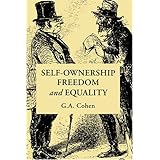Friday, July 11, 2008
Cohen Pt. 2
Posted by Simon Halliday | Friday, July 11, 2008 | Category:
Cohen,
equality,
Nozick,
Political Philosophy,
self-ownership
|
 This is the second in my series of posts on G.A. Cohen's Self-Ownership, Freedom and Equality. The first post was on Nozick's Wilt Chamberlin example.
This is the second in my series of posts on G.A. Cohen's Self-Ownership, Freedom and Equality. The first post was on Nozick's Wilt Chamberlin example. A central argument in Nozick's Anarchy, State and Utopia is that a proletarian who has a choice between death by starvation and working for a capitalist is free as a consequence of self-ownership.
He argues, furthermore that joint ownership the world's resources (a typical socialist ideal) results in the nullification of self-ownership.
The two positions are as follows. For the first, consider a world in which there are individuals ranked throughout society, from the richest capitalist to the poorest proletarian, say a particularly rich hacienda-owner, Cortés, and the landless worker on the hacienda, Peone. Nozick argues that, as long as this distribution came about as a result of a Lockean Proviso-type land acquisition rule, then it is just. Both Cortés and Peone are self-owning and are 'free' to choose.

Contrast this with the second situation situation where two individuals are shipwrecked. Neither of them owns any land on the particularly lush and fertile island. The one individual was disabled in the ship-wreck, the other is able-bodied. Call them Able and Infirm. They decide to own the island jointly, such that neither can make production decisions without the other. As Able cannot produce without the permission of Infirm there are five possible outcomes (see Cohen, 1995:95 for the exact details). I discuss the two interesting outcomes.
iv) Able produces, the amount produced determined independent of his choice, and it exceeds the amount required to sustain both Able and Infirm. They bargain over this surplus.
v) Able can produce a surplus, but he can vary its size; bargaining takes place over both surplus and the amount produced.
 Depending on the disutility of labour for Able and the disutility of infirmity for Infirm we should get an egalitarian distribution of resources. Egalitarian because the distribution does not depend on Able's talents, he gets nothing 'extra' because it is him and not Infirm who is producing. (ibid, 96). However, what we see in this example is that, even though individuals are self-owning, Nozick would argue that Able does not have effective self-ownership. As Cohen points out, "joint world ownership renders nugatory the self-ownership with which we had hoped to combine it. Self-ownerships is not eliminated, but it is rendered useless." (ibid, 98)
Depending on the disutility of labour for Able and the disutility of infirmity for Infirm we should get an egalitarian distribution of resources. Egalitarian because the distribution does not depend on Able's talents, he gets nothing 'extra' because it is him and not Infirm who is producing. (ibid, 96). However, what we see in this example is that, even though individuals are self-owning, Nozick would argue that Able does not have effective self-ownership. As Cohen points out, "joint world ownership renders nugatory the self-ownership with which we had hoped to combine it. Self-ownerships is not eliminated, but it is rendered useless." (ibid, 98)Cohen's contribution to this argument is that either
1) Nozick wants individuals to have effective freedom, or
2) Nozick wants individuals to have self-ownership in name alone: formal self-ownership.
Cohen argues that Nozick has a double standard for judging joint-ownership against private ownership of unowned resources. For joint ownership, the individual has self-ownership but is not effectively self-owning contrasted with the situation where the proletarian must work for a capitalist or die, and thus also has self-ownership, but is not effectively self-owning. Either Nozick wants individuals to have effective self-ownership or formal self-ownership. Which is it?

The consequence of which is that we should probably understand that what Nozick actually wants individuals to have is autonomy: control over their own lives. Which, Cohen argues, implies that there must be constraints on individual self-ownership in order for individuals to have autonomy. This may seem counter-intuitive, but the examples described give us a fair understanding of what formal self-ownership vs. effective self-ownership actually mean.
Consequently, accepting autonomy as our goal requires not only an abandonment of Nozickian self-ownership, but also an abandonment of the traditional socialist precept of joint ownership of the world's resources.
Consequently, accepting autonomy as our goal requires not only an abandonment of Nozickian self-ownership, but also an abandonment of the traditional socialist precept of joint ownership of the world's resources.
Subscribe to:
Post Comments (Atom)




Currently have 0 comments:
Post a Comment